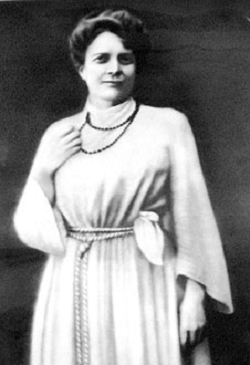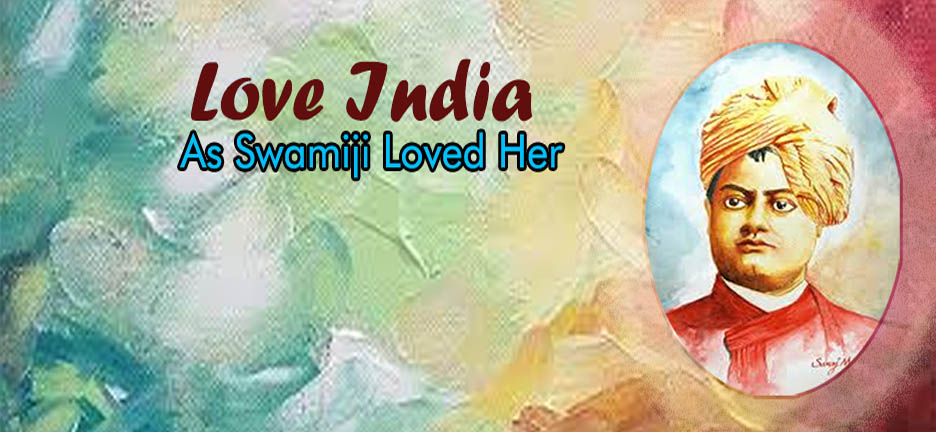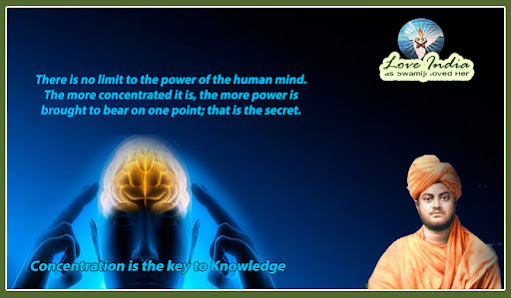 Sister Nivedita (1867 - 1911) was a versatile genius. The most regarded disciple of Swami Vivekananda, she was a revolutionary, lover of modern science, all arts, and philosophy and stood for emancipation of Indian Women.
Sister Nivedita (1867 - 1911) was a versatile genius. The most regarded disciple of Swami Vivekananda, she was a revolutionary, lover of modern science, all arts, and philosophy and stood for emancipation of Indian Women.
Margaret Noble was Irish by birth but became a true Indian and her love for India was incomparable. It was in London she was introduced to Swami Vivekananda. Vivekananda had become world famous through his extraordinary performance at the World Parliament of Religions 1895. Swami Vivekananda was the most celebrated disciple of Sri Ramakrishna who preached the world secularism, respect for all religions, paths of wisdom, devotion, and respect for woman. Swami Vivekananda had travelled to the West and spread the ancient teachings of Vedanta. In November 1895 Swami Vivekananda met Margaret Noble for the first time and she became his most devoted disciple - Sister Nivedita. During his second visit in 1896, their bond had strengthened.
“Swami Vivekananda was seated on the floor of West End drawing room in meditative pose, his face radiant with dignity and poise. Childlike simplicity and calm was radiating spiritual aura. Nearly fifteen to sixteen curious listeners, newcomers to Hindu thought, sat around the Swami in a half circle and listened with rapt attention every word coming from the mouth of the great Jnani and the orator.” Margaret Noble was one of them listening to the celestial words of the Swami who was elaborating ancient wisdom of the Upanishads and Vedanta to the small group,
“Friends, your Church is true, our temples are true; and true is Brahman, formless and eternal, beyond the two. Time has come when nations would exchange their spiritual ideals as treasures, as they are already exchanging the commodities in the market. These ideals are but various impressions in different modes of manifestation of the One. 'All these are threaded upon Me, like pearls upon a string,' so says the Lord in The Gita. Love is the highest virtue, love knows of giving alone, never expecting anything in return. Love God, but don't barter worldly pleasures and comforts in exchange for that.”
Further the Swami exhorted:
“Try not to accept the report of senses, for both mind and senses are but incomplete expressions of the transcendental third, the Self. Turning our faith in realization of that Self is religion. Karma, Bhakti, and Jnana are but three paths to this end. And common to all the three is renunciation. Renounce the desires, even of going to heaven, for every desire related with body and mind creates bondage. Our focus of action is neither to save the humanity nor to engage in social reforms, not to seek personal gains, but to realize the indwelling Self itself. Renunciation points to turning away from the world in search of this Self”.
And Margaret Noble, later to become Sister Nivedita, listened to every word, every idea, and every concept that was unique to her, new to her. Those words were full with deep meaning about true religion; words sweet yet foreign to this educated, literate, bold, and intelligent lady. Initially her ego resisted accepting what the Swami said, but finally she became his earnest disciple and India possessed a woman of dignity, poise, virtue, outstanding teaching caliber, a visionary, and all that is best in the world.
Sister Nivedita became so inspired with the teachings and vision of Vivekananda that she sacrificed her career in England and travelled to India. In India, Sister Nivedita studied Indian culture, served the Indian people and embraced the Hindu religion. She served the Indian people with devotion and tried her best to ameliorate the plight of Indian people. After the passing of Swami Vivekananda, Sister Nivedita dedicated herself for the cause of Indian independence. For this she had to formally leave the Ramakrishna order, as the order avoided political action. Still there remained a strong bond between Nivedita and the Ramakrishna order. Sister Nivedita frequently risked arrest to work for the cause of Indian independence. Her house became a meeting place for writers and politicians. She came into contact with some of the influential figures in the independence movement and noted among them were Shri Aurobindo and Mahatma Gandhi.
Along with working for Indian independence, Sister Nivedita worked tirelessly for the amelioration of the plight of Indian Women. She improved women’s education, especially Hindu widows whose lives turned disgraceful. She spent many years working in her small school for Women in the poorest suburbs of Calcutta. When deadly plague struck Calcutta it was surprising to watch Sister Nivedita working fearlessly and with even any regard for her own health. She brought famine relief to the most deprived ones, and improved the dreadful sanitary conditions, breeding grounds for the plague.
For her whole hearted acceptance of the Indian cause Sister Nivedita was widely admired by the Indian population The British ruling elite were perplexed on how an European would live amongst the poverty stricken, disadvantaged section of Indian society at that time when conditions of even ordinary Indians were unimaginable. No wonder her centenary celebrations in 1967 were held throughout the country. No wonder Sister Nivedita is widely admired in India today and will be admired till eternity.
Her contribution to Indian society is immense. In a dark age, when women were exploited, had no access to education, married while still were in innocent childhood, she as light with indomitable courage and integrity tried to uplift not with western views but with an Indian outlook. Surprising for a European, who were the rulers at that time, accepting Indian philosophy and knowledge, knowledge of the slaves as her ultimate goal to reach the transcendent life. She didn’t fail. Very few westerns before her must have regarded Indian women and admired her as she did. According to her
“India is, above all others, the land of great women. Wherever we turn, whether to history or literature, we are met on every hand be those figures, whose strength she mothered and recognized, while she keeps their memory eternally sacred.”
She also said,
“What is the type of woman we most admire? Is she strong, resourceful, inspired, and fit for moments of crisis? Have we not Padmini or Cheetore, Chand Bibi, Jhansi Rani? Is she saintly a poet, and a mystic? Is there not Meera Bai? Is she the queen, great in administration? Where is Rani Bhowani, where Ahalya Bai, where Jahnabi of Mymensingh? Is it wife-hood in which we deem that woman shine brightest? What of Sati, of Savitri, of the ever glorious Sita? Is it in maidenhood? There is Uma. And where in all the womanhood of the world, shall be found another as grand as Gandhari?”
India to her was the greatest. She loved India as according to her, India was the birthplace of the highest and best of all religions. India she loved because it is a country where the homes are simple, and where domestic happiness was most to be found. She loved India because Indian women unselfishly, unobtrusively, ungrudgingly serve the dear ones from early morning to dewy eve and above all she loved India as India has the grandest mountains in the world-the Himalayas.
Though the entire world is familiar with Swami Vivekananda and Nivedita’s great respect and admiration for each other, it is interesting to know that Rabindranath Tagore too had great regard for this versatile genius. Sister Nivedita was held in high regard by Rabindranath Tagore, who felt Nivedita to be an exceptional soul. Though they had met quite a number of times, they never worked together and thus Tagore had written,
“I had felt her great power, but with all that I understood that her path was not for me. She was a versatile genius, and there was another thing in her nature; that was her militancy. She had power and she exerted that power with full force on the lives of others. When it was not possible to agree with her, it was impossible to work with her.”
Dr. Jagadish Chandra Bose and his wife Abala Bose were among her closest friends. Dr. Bose was invited to the International Congress of Physics that was organized at the Paris Exhibition where he read his famous paper, “Response of Inorganic and Living Matter.” Swami Vivekananda and Nivedita attended the Congress and were full of appreciation for the first scientist of India. In protest against a section of British scientists who rose against the great scientist, Sister Nivedita had written,
“Oh, India, India! who shall undo this awful doing of my nation to you? Who shall atone for the million bitter insults showered daily on the bravest and keenest nerved and best of all your sons”?
As a devoted disciple she was supreme. As a metaphysician, she was an avid reader of the mystery of the universe. As an author, she was incomparable. As a revolutionary, she was fearless. With a deep understanding of science, as a scientific minded philosopher, she was the grandest. As a social worker, she was unparalleled. From embroidery to modern science she was interested in all that is the best. Her students guided by her, didn’t embroidered just a sari but the Indian flag. She herself designed the National Flag. Her personality had all hues of a rainbow - her deep interest in science, metaphysics, art, and culture. A philosopher, author, nationalist, and revolutionary she churned the curd, left the buttermilk and tasted only the butter. Her life is a metaphor of all that best in the world, as she comprehended the unlimited in her limited body.
To portray such an extraordinary personality in a few pages is indeed an uphill task. Her extraordinary appearance with impeccably described by Mr. A.J. F. Blair,
“A tall, robust woman in the very prime of life. Her face in repose was almost plain. The cheekbones were high and the jaws were supreme. The face at the first glance expressed energy and determination, but you would hardly have looked at it again but for the forehead and the eyes. The eyes were a calm, deep blue, and literally lit up the whole countenance.”
Mr. Nevinson had paid tribute in following wonderful lines,
“It is as vain to describe Sister Nivedita in two pages as to reduce fire to a formula and call it knowledge. There was, indeed, something flame-like about her, and not only her language but her whole vital personality often reminded me of fire. Like fire, and like Shiva, Kali, and other Indian powers of the spirit, she was once destructive and creative, terrible and beneficent.”
She was indeed a combination of keen intellect and noble heart. No wonder the most celebrated Indian artist, Abanindranath Tagore visualized her as an ideal of beauty and considered her as meditating Uma.
She breathed her last in Darjeeling, on the lap of her favorite Himalayas. News of her death spread all over with lightning speed and prominent persons from Calcutta and others wended their way to the Ray Villa to pay homage to the departed and thousands joined her funeral procession. To respect the daughter of the soil, a samdhi was raised later over the sacred spot where she was cremated. In the lap of her favorite Himalayas rested the supreme soul and the memorial states, “Here reposes Sister Nivedita who gave all to India.”
Indeed she gave her all to her India, the land Ramakrishna Paramhansa, Ma Sharada, Swami Vivekananda and the land of all religions.
O You Genius, O You Revolutionary
The most cultured and greatest philosopher
We the women of modern India
Pay our greatest regards to You.
Thank you, Sister.
Thank You.
by Mandira Ghosh





 Sister Nivedita (1867 - 1911) was a versatile genius. The most regarded disciple of Swami Vivekananda, she was a revolutionary, lover of modern science, all arts, and philosophy and stood for emancipation of Indian Women.
Sister Nivedita (1867 - 1911) was a versatile genius. The most regarded disciple of Swami Vivekananda, she was a revolutionary, lover of modern science, all arts, and philosophy and stood for emancipation of Indian Women.




















